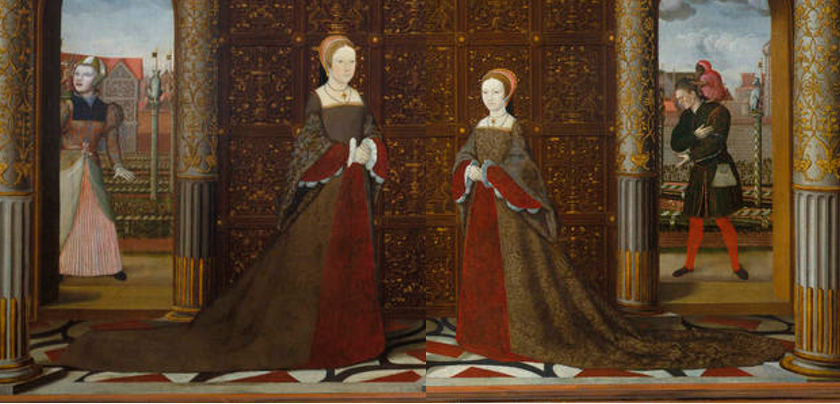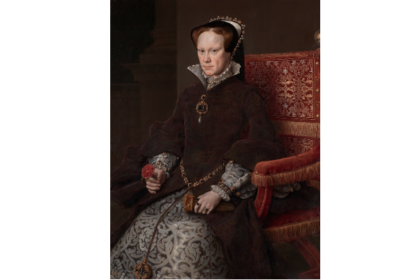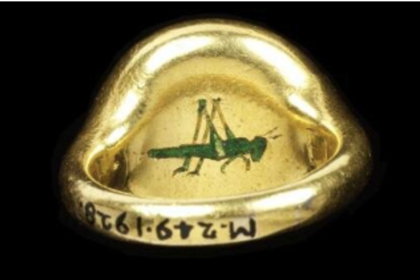ABOVE: Details of Mary (left) and Elizabeth (right) from ‘The Family of Henry VIII’ by an unknown artist, c.1545
I have spoken on this page before about the thrilling and frustrating nature of historical research. Well, I have once again faced this with a wonderful gem of a source, which is both tantalising and elusive.
Whilst perusing ‘Letters and Papers, Foreign and Domestic, Henry VIII,’ I came across an entry dated to September 1533, a list of ‘remembraunces,’ noted down by Thomas Cromwell to act as reminders. We are very lucky that many of Cromwell’s notes survive, and have been published on several occasions; most famously in the 19th century in Gairdner’s ‘Letters and Papers,’ and most recently in 2021 with Caroline Angus’ ‘My Hearty Commendations: The Transcribed Letters and Remembrances of Thomas Cromwell’ – an essential for the bookshelf of any Tudor enthusiast or historian.
As I scanned down the list in ‘Letters and Papers,’ my eyes locked on a single line that made me very excited:
‘the Balade made of the Prynces by my Lady Mary.’
This note, which is so evocative, has received incredibly little attention. The idea of a verse written by Mary about the birth of her half-sister Elizabeth to me is incredibly exciting. Only a small handful of historians even make mention of it though; despite searching through many volumes and journals, the only references I could find to it were in the introduction to the 19th century publication of ‘Privy Purse Expenses of the Princess Mary, Daughter of King Henry the Eighth’; two 20th century biographies of Mary, including David Loades’; one biography of Elizabeth I; and a couple of academic journal articles. None of these contain more than passing remarks to the note.
I must admit it is understandable; tragically the ‘balade’ itself does not survive, so there is very little to go on. But I find the note so fascinating that it is worth drawing out as much information from it as possible.
Cromwell wrote this note in the September of 1533, within a month of ‘the Prynces’ Elizabeth’s birth. It seems that Mary, the older half-sister Elizabeth had displaced, had indulged and vented her emotions about her little sister in a piece of poetry or song.
I should take a moment to note that there is actually another interpretation of Cromwell’s note. In ‘Letters and Papers,’ the editor, James Gairdner, states in a footnote that ‘by the Lady Mary’ actually means that the ballad was about Mary, not written by her; an interpretation accepted by David Loades in his biography of Mary. No other historian has taken up this interpretation though, and I think that the wording makes it clear that the verse was ‘of the Prynces’, i.e. about Elizabeth, and composed ‘by my lady Mary.’
Most other records suggest that Mary treated her little half-sister well, and they were quite close when Elizabeth was young. Whilst Mary was obviously distraught and angered at being set aside, stripped of her title and place as heir, and made to serve Elizabeth, all her letters and records of her behaviour suggest that she kept her dignity and her wits about her whilst fighting against her enemies – her father, Henry VIII; his new wife, Anne Boleyn; and their courtiers, especially the Boleyn faction. Her intelligent, dignified defence of her position can be seen in a letter she sent in December 1533:
‘My lord, as touching my removal to Hatfield, I will obey his grace, as my duty is, or to any other place his grace may appoint me; but I protest before you, and all others present, that my conscience will in no wise suffer me to take any other than myself for princess, or for the King’s daughter born in lawful matrimony; and that I will never wittingly or willingly say or do aught, whereby any person might take occasion to think that I agree to the contrary.’
But we must remember that Mary was still very young, only 17. We can only imagine what her emotions must have been at this time – anger, betrayal, despair, loss. Despite asserting that she would treat Elizabeth as ‘sister’ in the same way she treated Henry Fitzroy as ‘brother,’ I think it would be difficult for Mary not to feel some level of animosity or bitterness, even if misplaced, towards Elizabeth. Giving voice to these feelings through verse must have felt a little cathartic. Every move Mary made was being watched, however, and clearly, someone reported back to Cromwell about her indiscreet ‘balade.’
The contents of the song (or poem) can only be guessed at; given Mary’s insistence that Elizabeth was illegitimate and therefore no ‘prynces,’ it was probably a petty ditty labelling Elizabeth a bastard. We only get a hint of Mary’s state of mind, but I think it is revealing nonetheless.
It is actually even unclear what form is actually meant by ‘balade’; both poetry and song could be referred to as such, and Mary had an extensive literary and musical education which gave her the skill to compose in either form. We know that Mary was a talented musician, able to play the virginals, lute, and harpsichord, so I like to think that it was a song.
I can only hope that one day a forgotten manuscript emerges from a dusty archive somewhere that has Lady Mary’s ‘balade’ in it. I, for one, will keep digging, trying to find any clues and references to it that I can.






[…] MARY’S BALLAD ON ELIZABETH […]